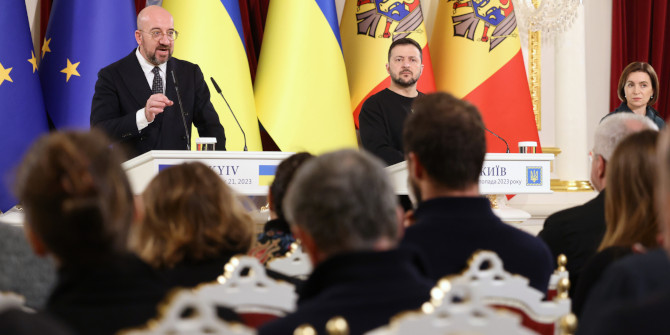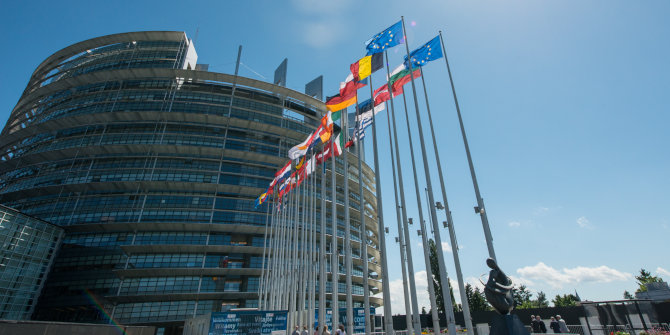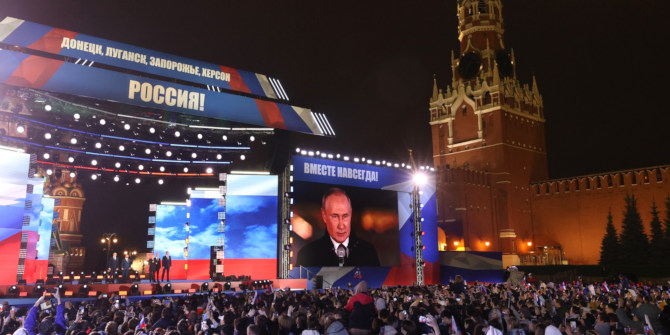 Much of the reaction to the terrorist attacks in Brussels on 22 March has focused on the perceived threat Islamic State (IS) poses for European citizens. Ranj Alaaldin writes that while IS has carried out a number of high profile attacks recently, this should not overshadow the fact that it is now a declining force in Syria and Iraq.
Much of the reaction to the terrorist attacks in Brussels on 22 March has focused on the perceived threat Islamic State (IS) poses for European citizens. Ranj Alaaldin writes that while IS has carried out a number of high profile attacks recently, this should not overshadow the fact that it is now a declining force in Syria and Iraq.
Just hours before the terrorist attacks in Brussels on Tuesday, I was at the frontline of the war on ISIS in Iraq’s Kurdistan region, which shares a 1,000km border with the jihadists. I was in Taza (Kirkuk province) up until late Monday evening. Residents there are still recovering from a chemical attack carried out last week, but are also displaying brave defiance by going about their daily routines, much like the people of Brussels have been.
But the chemical attack on Kirkuk, like the terrorist attacks on Tuesday, was a backlash, a response to a string of defeats ISIS has suffered over the past year. The jihadists are on the decline and fighting a losing battle.

Over the past week, I have interviewed a number of security and intelligence officials in Kurdistan, along with military commanders and ISIS prisoners. Where once upon a time ISIS projected itself as an invincible force, those days are long gone: the number of foreign fighters joining the organisation has dramatically declined. Its so-called Caliphate has lost 40 per cent of its territory in little over a year. In the months since the Paris attacks in November last year, ISIS has lost more than seven major towns and cities.
US military officials in Kurdistan tell me that its overall network and leadership is being decimated by the US and the international coalition, which has a significant presence in the skies above Iraq and Syria, as well as on the ground, where they work with local forces such as the Kurdish Peshmerga (“those who face death”). ISIS leaders are dying at a rate of one every three days.
Since May 2015, ISIS has been unable to launch a successful operation and has been reduced to what Kurdish security officials here in Kurdistan describe to me as “pathetic attempts to make their presence felt”, which often involves firing mortars and Katyusha rockets at empty civilian buildings in the outskirts of Kurdistan’s major cities.

This is not to say this war will be over anytime soon. ISIS is a reincarnation of an organisation or movement that has proven on numerous occasions that it has the capacity to revitalise and reorganise itself. The Kurds have had to confront radical Islam and jihadist movements for much longer than most nations. “ISIS is an idea, not the first of its kind and not the last of its kind” said Kak D, the head of one of Kurdistan’s powerful security agencies, whose name I won’t reveal to protect his identity (“Kak” is a Kurdish term that carries respect and affection).
What is particularly striking about the discourse amongst officials and the public here is that whilst it is acknowledged ISIS represents an ideological threat and a challenge that will take many years to combat and contain, this does not mean it cannot be uprooted, that its network and infrastructure cannot be dismantled. The Kurds have done this before and are confident that they can do it again. Kak D explained it was time for the West to take emotions out of security matters, “It’s strictly a security matter for us” he said, before asking whether I was ready to interview ISIS prisoners.
Please read our comments policy before commenting.
Note: This article gives the views of the author, and not the position of EUROPP – European Politics and Policy, nor of the London School of Economics.
Shortened URL for this post: http://bit.ly/1VNPtp1
_________________________________
 Ranj Alaaldin – LSE
Ranj Alaaldin – LSE
Dr Ranj Alaaldin is a Middle East specialist at the LSE and Associate Fellow at the International Centre for the Study of Radicalisation (ICSR), King’s College London. His research examines social movements and sectarian conflict in the Middle East. Prior to his PhD, he served as a senior consultant to the Next Century Foundation, a track-two conflict resolution think-tank. He has conducted extensive fieldwork in Iraq and the broader region.






Well they would be losing in Syria, with all of their fighting aged men living in Europe.
Why ISIS is getting high profile coverage of its attacks in Europe? It is because of the stupidity of the Europeans. Say, for example, if I have a bomb, it does not necessarily mean that I could carry it anywhere I like. If I try to take it into an air port, I should be caught at the entrance itself, or somewehere on my way to the airport. My only advice to European leaders is not to scare their citizens about ISISI. Use your brains a bit.